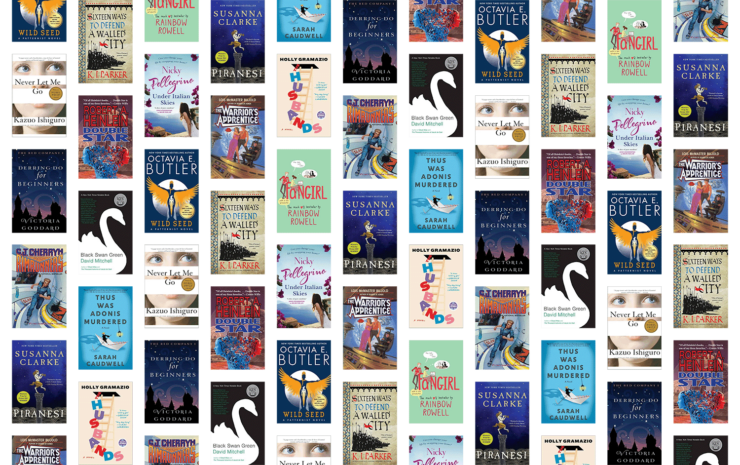It seems like we’ve all embraced the concept of comfort reads (and comfort shows/movies) lately, particularly over the last few tumultuous years. There are cozy mysteries, domestic fantasies, stories where nothing bad happens, books that focus above all on kindness and caring—the kind of tales we turn to and share whenever we need to feel better about the world. Well, I’d like to acknowledge another type of story that belongs in this category: Competence porn. I find that competence porn can be really, really comforting (and I’d welcome more of it, so if you have any recommendations, please mention them in the comments!).
If you know what I’m talking about, you probably don’t require much convincing. If you don’t, I’ll break it down for you: What the hell is competence porn?
The term was coined by John Rogers, creator of the TV show Leverage—one of our best examples of this particular type of storytelling. If you’re not familiar with Leverage, the show is about four professional thieves with distinctive skill sets who team up with a mastermind planner to get revenge on rich and powerful assholes who take advantage of people and ruin their lives for profit. (It’s extremely gratifying.)
Rogers wanted a shorthand way to talk about the very specific kind of satisfaction that we feel when watching folks competently handle complex situations using the kinds of specialized skills and expertise that we can all appreciate (even if we can’t personally replicate them), and he came up with “competence porn.” It’s about both the process and the outcome, and the comforting safety net of knowing that whatever challenge arises, the whole thing is in, well, extremely competent hands. Of course there are different permutations and varieties and genres involved, but we can lay out some basic ground rules—a formula for the type of story we’re talking about, for the sake of discussion.
First of all, we need experts: People who are so good at their craft that they can improvise and rise to any challenge, adapting to any obstacles or changes in the plan. We start with our mastermind, the genius who sees how all the pieces fit together, the big picture-seeing visionary with the top-down view, who keeps everyone calm even when the shit hits the fan. This mastermind is watching out for the team and also for us, the audience, providing the safety net we need. Knowing that this genius is around, thinking ten steps ahead, we feel safe enough to commit to enjoying the antics that will play out, as suspenseful as they may be, and we can allow ourselves to invest in and care about the characters, in spite of the massive risks they’re taking.
Next we need a team of specialists. Sure, you can absolute argue for something like the John Wick franchise being competence porn based around a single character (he certainly is competent!), but I tend to prefer stories built around the satisfaction that comes from seeing a team or group of extremely competent people synthesizing their skills and learning to work together. It’s thrilling in the same way as watching a big dance number with complex choreography, or really great improv comedy acts, with everyone hitting their mark at the exact right time—or if they didn’t, their team covered seamlessly, and the audience will never know. Thought that was a fatal blunder? Think again—either the misstep will be revealed to be intentional, or it will be used to the team’s advantage, so that everything turns out even better than expected. There’s just something incredibly satisfying about watching a group of people so perfectly attuned to one another that they can accomplish something none of them could alone.
Now, these team members need to be people who can solve problems within their area of expertise by thinking outside the box and coming up with just the right trick, hack, or workaround. They’ve seen every iteration of how things could go, and they have all that experience to call upon, as well as the ability to improvise and quickly shift to new variations rather than sticking rigidly to one original idea or plan.
Oh and speaking of the original idea? Well, actually, there tend to be dozens of “original” ideas: Plans A through Z have been careful considered and will often come up in comical discussion between characters. In the very first episode of Leverage, computer expert Hardison asks if it’s time to go to plan B, and mastermind Nate tells him, “Technically, that would be plan G.” When Hardison asks how many plans there are, “Is there like, a plan M?” Nate assures him that yes, he has thought that far ahead, but unfortunately, “Hardison dies in plan M.” This kind of banter is de rigueur between team members, particularly when they’re under pressure—this light repartee graces the conversation of recent competent teams like the Crows in Shadow and Bone, or Lockwood and his associates in Lockwood & Co.
When it comes one-upsmanship with one another over who’s the MVP of a particular caper or which variation of the plan is best, it’s generally best to have a good dose of smartassery all around. There may be some examples of competence porn that don’t draw on this type of humor, but for me, there’s nothing drearier than a story that takes the action so seriously that nobody can ever crack a joke—no matter how high the stakes are, there should always be room for a little fun or a quick quip.
So, who do we need on our team? Well, it depends on what you’re trying to accomplish. Leverage begins with a mastermind who brings together a hacker/tech expert, a hitter (the muscle), a master thief proficient in everything from cat burglary to safe-cracking to picking pockets, and a brilliant con artist (aka: the grifter). As is often the case in these stories, the team members start out as loners who don’t play well with others, but as they learn to cooperate professionally, they eventually find themselves growing into friends, and even family. The plots are often, but not always, capers (think The Italian Job, or Ocean’s Eleven). Depending on your goals, your ideal team might include a driver, a demolitions expert, a magician, a forger, or a really good librarian. Whatever the situation calls for, they’ll be the best in their field, and probably have a bone to pick with powerful (often corrupt) individuals and institutions.
Because “competence porn” isn’t quite a genre and examples that tick most of the boxes above aren’t marketed as such, it’s always a delight to recognize one of these types of stories—and perhaps it would be best to call it a team dynamic instead of a genre (depends on how strict you are about labels). I’ve seen examples spring up all over the place in newer science fiction and fantasy stories, and I couldn’t be happier. Hyper-competent Murderbot learns to work with others (multiple times) and everything comes together when they learn to trust each other in Martha Wells’ Murderbot series. Galadriel “El” Higgins, from Naomi Novik’s Scholomance trilogy, works her team of wizards hard because it’s the only way to stay alive—but together, they thrive. Even the day-to-day grind of working in local government that we see on Parks and Recreation is incredibly fun to watch because Leslie Knope and her team (regardless of their attitudes toward their jobs—looking at you, Ron Swanson…) are actually all fantastic at what they do.
There’s something so very gratifying about watching people live up to their full potential—getting to see all the hard work they put in pay off, not just in their private satisfaction but as part of a group of similarly talented, driven people who have dedicated themselves to their craft, and a shared goal. It’s not unusual to dream about being outstandingly good at something, and in the end there’s a level of pure enjoyment that comes from seeing someone doing something they love, perform flawlessly, and win the day.
As I mentioned up at the top, I’m always searching for new books, shows, movies (or anything else) that fits into the category of “competence porn,” so I’d love to hear your thoughts, suggestions, and favorite examples of hyper-capable teams of rogues, professionals, and/or unlikely heroes—please share in the comments.
Originally published in July 2023.















I will point out that Leverage is — in my view, and Rogers accepted it — a superhero show. Each of the team members is so good in their field they approach demigod status.
The movie Sahara hit me as close to that — the team, including but not limited to Dirk Pitt and Al Giordino — are all extremely competent. (The scene that got me there was Dirk telling everyone to drop their weapons, and Al takin a couple of minutes to do that.)
Definitely a thing Rogers likes to do, since his next show, ‘The Librarians’, was basically the same genre, if even more blatant in making the team a bunch of super-experts.
The original ‘Mission: Impossible’ in the 1960s was the epitome of competence porn, with team leader Peter Graves getting assigned his mission at the top of the show, then going through the photos of the possible team members to pick out his team for that week’s episode. As you came to know their skills, you could guess how the mission would be carried out based on who Graves picked – “ooo, he picked the strongman this week”.
I’d add Gail Carriger’s Custard Protocol series, Seanan McGuire‘s InCryptid series, and Kevin Hearne‘s Ink & Sigil to that list.
@3: I came in here to post the exact same thing. The 1960s M:I was the original competence porn, even though he picked the same 3-4 people every single time. Amazing how every Eastern European wannabe dictator coincidentally happened to look exactly like Martin Landau or Leonard Nimoy.
This is so my jam. I’ve been pursuing competence porn my whole life. Things like Leverage, Mission Impossible, and the Oceans 11-13/8 movies are built entirely upon it. But there’s so much more.
In books, you’ve got most stuff by Asimov, David Brin, Brandon Sanderson (especially Mistborn, the first book is basically a “Let’s go steal a kingdom” episode of Leverage), Scalzi…pretty much any “hopeful” hard sci-fi.
In TV, pretty much anything by Aaron Sorkin. Set aside the fantasy of the specific politics, and the West Wing is entirely about the smartest people in the world trying to solve the biggest problems. “Fantasy” procedurals — House, Poker Face, Columbo, etc. — are usually built around this “the best of the best facing serious issues” approach. Even something like Scrubs works so well (setting aside the extremely hetero-normative framework) because we believe that they’re really, really good doctors; compared to most medical “dramas”, where “who’s gonna screw up in the ER/OR this week?” is a regular plot point.
Maybe my favorite variation on competence porn is competence horror. A movie like Predator: the first 1/3 of it is spent establishing just how hyper-competent this badass special ops team is. They’re good enough to choose their missions (and thus tell superior officers “no”), and take out an armed camp, outnumbered 10-1, in like 5 minutes with a couple of scratches. It’s pure 80’s action movie competence porn.
So when something shows up that is even more competent, so much so that it can toy with these he-men…well, that’s scary.
Kate Elliott’s The Keeper’s Six has some aspects of that. Each member of the Hex has a special kind of magic that helps the group as a whole travel and operate in the Beyond, the space between worlds. I liked this for a number of reasons, but relative to this question, because the division of skills across the group is reasonable but not exactly what I expected. Also, members can be highly competent but also hard to work with.
Going way back, Kimball Kinnison of the Lensmen books was highly, perhaps implausibly competent.
Cliopher Mdang of The Hands of the Emperor is extremely competent – a rare SFFal bureaucrat who is both competent and well-meaning – and he’s also good at bringing out talents in other people.
Action/adventure along the lines of Jack Reacher and Clive Cussler’s novels are what I call manly man novels. Characters and their team can do everything and can pick new skills out of the air when needed. It’s guy Mary Sue in the same way romances are women’s Mary Sue.
Cherryh’s Foreigner books fall well into this particular genre. Bren is hypercompetent in dealing with both human and atevi issues and his team behind/beside him does the same. Plus there is the competence of his close allies, notably Tabini and Illsidi..
I highly recommend Netfix’s Money Heist for a team of hyper-competent robbers led by a true mastermind, and Criminal: United Kingdom for a team of hyper-competent murder detectives.
In terms of a book that is either adjacent to or a progenitor to this concept, there is Jules Verne’s Mysterious Island. The most mind-blowing aspect of that book for me is that the shipwrecked (actually balloon-wrecked) protagonists are stranded there with nothing but a match and a tobacco seed, and a few months later are tooling around on their own railroad (and smoking pipes too, I guess).
The Martian, both the book and movie, is chock full of people who are competent to a pornographic level. And even with all of them working together they barely get Watney home alive. One of my favorite bits in the book is when the German chemist, Vogel, has to build a bomb out of supplies that were chosen specifically to avoid explosions. His only concern is not making it too powerful, but luckily a good deal of his training was in not accidentally making bombs so doing it deliberately is easy.
@11Peter M: As a young adult, I was a tutor in a summer camp with about 100 youth of 14 to 16 years. We were on the Island of Corsica, on an absolutely dried out meadow. Some of the youth had all sorts of stuff with them to play pranks like stink bombs. When we found that out, I had a good look at the chemicals and mixed some of them together (potassium permanganate, zinc powder and potassium nitrate), put a drop of glycerine on it and stepped aside. With a whoosh, the mixture lit up. The same went for ammonium nitrate and zinc powder plus a drop of water. They might have burned down the camp by just stepping on their bag or rolling on it in a tussle. (In fact, a field across the road burned down some days later, but that was arson commissioned by somebody wanting to get rid of the old protected trees there in order to get permission for building a hotel on the ground – mission accomplished, principal jailed).
I was a lab assistant then, now I am a German chemist despite mostly doing other stuff for a living. We obviously have a tendency to demonstrate how easily things can be used to make such stuff happen and to remember those recipes. At least with those youth, the effect was a steep decline of their inclination to consider us ignorant and easy to be played with. A light hint of competence porn.
Does the 2011 film Limitless qualify? Not just because he has a pill that literally makes him more competent but because actually a bunch of people take the same pill and he’s the only one who really takes it to the level that he does. It is a really fun and satisfying movie.
In books, Harry Harrison’s Stainless Steel Rat series. And de Foe’s Robinson Crusoe. I also second @10 and @11 for The Martian and The Mysterious Island.
For TV, I’d submit Criminal Minds, where the team possess almost superhuman skills in their fields.
Some good examples up above; without getting to far into the “ubermenish” elements of the Lensman series (and Heinlein-dom), or the mystical, Clarke wrote a few, from early in his career (A Fall of Moondust) to fairly late (Rendezvous with Rama).
Some other oldies where authors came up with characters were very capable, but not over the top: Piper (Omnilingual), Anderson (many of the “Technic History” tales), etc.
Andy Weir probably comes the closest to the above, these days.
The 24 “Parker” crime novels by Donald E Westlake (writing as Richard Stark) are the examples I’ve always used for this.
Parker is always the rock in the sea of chaos around him, as his team tries to carry out its heists.
Also Ocean’s Eleven.
#16 – Fair. Dortmunder & Co. are the reciprocal, presumably?
Scorpion was like that. Super geniuses take on secret or critical government-based problems. And their poor handler has no idea what’s going until someone needs their backside handed to them.
Agents of SHIELD will always be on this list for me. It’s comforting to watch and fun to go back to the beginning.
Protagonist Adam Reith, in the 4-book Tschai cyclus by Jack Vance, is a very competent person, who can make the best of every situation.
Also Kirth Gersen, the protagonist of the 5-book cyclus The Demon Princes by Jack Vance, is highly skilled, trained to take revenge on the 5 master criminals who massacred his entire community.
The stories aren’t structured this way, but Doc Savage and his crew absolutely fit the mold of the mastermind surrounded by experts who are each the best in their fields.
@13 I don’t consider Limitless (movie or tv series) to qualify, because they use an actual super-hero. Same with Doc Savage and the like.
The trick is to find the balance — characters who are justifiably and naturally competent, even if in just one field, without clearly not being human. Again, Leverage — but compare that with Caper which was about actual super-characters. One was competence porn, the other wasn’t.
I suppose Sherlock Holmes (in most of his incarnations) is also an example.
A recent entry into the genre would be Miles Cameron’s “Artefact Space”. In which the heroine and her associates survive by dint of such unfashionable things as doing their training, passing their qualifications and thinking carefully.
Sir Terry makes it clear when he points out that people who “follow their dreams, blah, blah” will be beaten by those who got up early and put the work in.
Gordon R Dickson’s novels (especially “Tactics of Mistake” are very much about groups of experts in various fields.
OMG- this is absolutely the reason why I loved “The A-Team”! I was a kid when it was on TV, and it was really the first show I watched regularly that had problem-solving of this type!
“I love it when a plan comes together!”
I’d submit the Miles Vorkosigan saga by Lois McMaster Bujold. He kind of stumbles into success at times, but usually because he’s surrounded himself with extremely competent people.
I just realized the ultimate example of competence porn is Apollo 13, both the real-life drama and the movie. The movie has an interesting approach: Even though we know how it’s going to turn out (seriously, is there anyone over the age of 15 who was surprised by the ending?), we are fascinated by how the team works together (both in the spacecraft and at Mission Control) to get the astronauts back safely.
It also spawned the best possible motto for competence porn: “Failure is Not an Option”, followed up by the CP corollary: “Work the problem, people!”.
John Roberts did competency porn one better than most of the other examples. He had at least one hyper-competent adversary in James Sterling. As he has said it as canon, ‘Sterling never loses.’
Then there was Season 3’s ‘The Italian.’ Unlike going against Sterling, Nate may have considered going against her wishes, but recognizes this would not be a good idea.
I thought everyone at Tor agreed that Star Trek: The Next Generation was apex competence porn–especially in episodes like “Cause and Effect”, where they teamwork-ed their way out of a time loop…
Reacher.
Somewhere else someone stated that Lee Child’s Jack Reacher series was the same as Uhtred of the Saxon Chronicles. No way Reacher’s author would ever have allowed his Competence Hero to suffer slavery at all, much less such a prolonged, breaking suffering that Uhtred suffers, including losing his dear companion, in the midst of the Chronicles.
I have read all the books in both series in order, one at a time, as they were published, year after year.
Watched the tv too.
Like both of them in both versions very much.
So I guess I’d know. Ha!
My first thought was of the book I’m currently rereading, Barrayar. Someone above mentioned Miles Vorkosigan; although his father is certainly competent, his mother may be even more so, and the adventures in this book, from her POV, attest to that.
But really, most everything I enjoy watching qualifies, from Perry Mason to Thunderbirds, excepting only shows where the problem to be resolved is romantic in nature.
Behind the Iron Curtain this used to be called Manufacturing Novel, because – as a rule – it described some manufacturing process, may it be building a space ship or a dam for an artificial lake. :)
@31 Almost all of Aral’s competence happens offscreen. Aside from Miles and Cordelia, we also get Ivan, eventually. I have a particular fondness for his displays of competence (even if it’s just doing what Miles tells him to).
I should have put her right up top of any list of competence protagonists: Saint Hilda of Whitby, as she is portrayed and narrates the two novels of her life by Nicola Griffith: Hild and Menewood. Her means of competence, beyond having a particularly brilliant mind, is her capacity for seeing and remembering, and thinking ahead. She’s almost a demigod in her capability — yet she’s completely human, and she loves, suffers, grieves and exalts like any human and for the same reasons.
@33 – yes! I’m glad Ivan got his own book.
A classic example of competence porn in fantasy can be found in Graydon Saunders’ Commonweal Series, especially “A Succession of Bad Days” and “Safely You Deliver”.
Lord of the Rings. Aragorn, especially in “Fellowship”, is supremely competent. As are the other non-Hobbit members of the Fellowship once it sets out. (Well, Gandalf, being a Maiar, is somewhat off to the side in this consideration.) The hobbits, themselves, don’t really demonstrate high level competence until the Scouring of the Shire when Merry and Pippin (and Sam and Frodo, but more quietly) fully come out as Heroes.
The Misfit Soldier by Michael Mammay. Space Marine Sgt. “Gas” Gasovsky puts together a team for which “ragtag” would be an understatement, in order to rescue a fellow squadmember they were ordered to abandon under suspicious orders. They prove remarkably adept in improvising when their plans begin falling apart almost from the get-go, which includes being blackmailed into including another teammate at the last minute, who may in fact be there to either sabotage everything or rat them out to their superiors. Oh, and watch out for f*cking space whales (and don’t let Putty date your sister).
The BBC Hustle is very similar to Leverage, but without the over the top scale of the heists. It has the same heist for good model, but much warmer characters and some interesting explanations of skill done by breaking the fourth wall.
Doc Savage and the Fabulous Five: Monk, Ham, Johnny, Renny and Long Tom!!!!
No love for Buckaroo Banzai? C’mon, people!
Ishmael Horatio Wang in Nathan Lowell’s Solar Clipper series. Upon reflection, all of Lowell’s works seem to feature a widely skilled protagonist, with just enough foibles and failings for there to be a story….
I’m aware that the main essay is about competence in teamwork, but I’m also reminded of movies like the “Taken” series with Liam Neeson and the “Equalizer” series with Denzel Washington where the main enjoyment as a viewer comes from watching the lone-wolf main characters use their competence and training to hunt down and dispatch large numbers of bad characters in order to save a person or a place from said bad characters. IIRC, in both series those characters acquired those skills through a prior career in law enforcement and/or intelligence gathering from which they’re now retired.
In that regard, here’s Liam Neeson’s character’s iconic response by phone to the kidnappers of his daughter in the first “Taken” movie:
“I don’t know who you are. I don’t know what you want. If you are looking for ransom I can tell you I don’t have money, but what I do have are a very particular set of skills. Skills I have acquired over a very long career. Skills that make me a nightmare for people like you. If you let my daughter go now that’ll be the end of it. I will not look for you, I will not pursue you, but if you don’t, I will look for you, I will find you and I will kill you.”
Needless to say, things end badly for his daughter’s kidnappers.
Olivia Pope & Associates.
I see this shift in storytelling as healthy and a sign of growth, particularly in Sci Fi. I always wondered why we fetishize a future where people suffer the same problems and issues as we do now? Why are our stories constantly reinforcing bad modes of communication? Why don’t we “escape” into something that shows us a better way?
I see works like what Becky Chambers is doing as much healthier for us to consume. Instead of pointless drama because people couldn’t hold a simple conversation, we get lessons on how to embrace difficult things and work them out healthily with support. If it’s hundreds or thousands of years in the future, surely people can actually talk, right? I just want a movement of media that shows us being better and equips us to communicate effectively instead of always leaning in on needless drama as a plot mechanism.
See also the Fighting Pumpkins cheerleader squad in Seanan McGuire’s Dying With Her Cheer Pants On,” as they defend their town (and the entire planet, a couple of time) from various supernatural and science-fictional menaces.
AJ Sherwood’s How to Shield an Assassin is a prime example of this. The same author has a number of other series featuring competence porn, under several pen-names.
#41. Indeed.
“Buckaroo, The White House wants to know is everything ok with the alien space craft from Planet 10 or should we just go ahead and destroy Russia?”
“Tell him yes on one and no on two.”
While it’s not only this, one of the pleasures of the Elmore Leonard adaptation series Justified is when somebody challenges Raylan Givens to a gunfight, which never ends well for any of them.